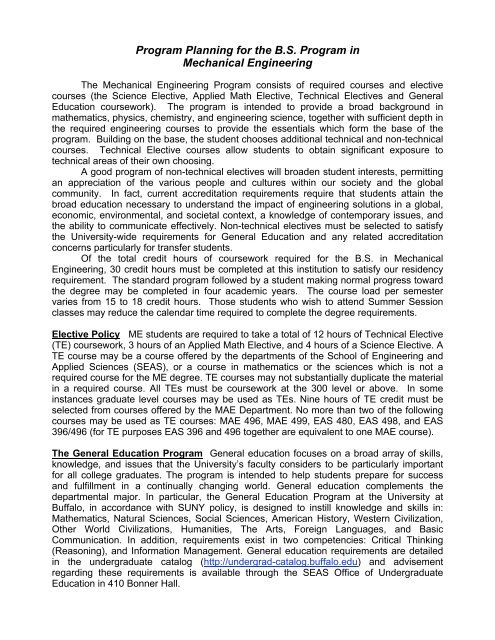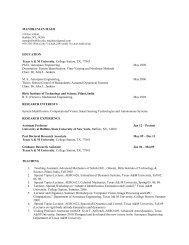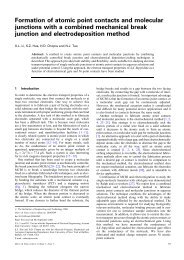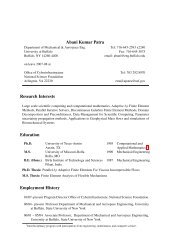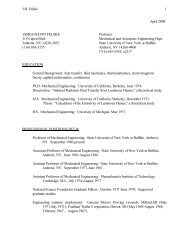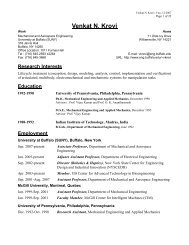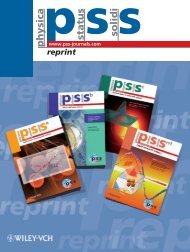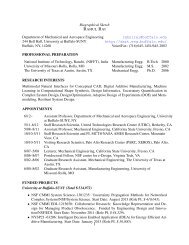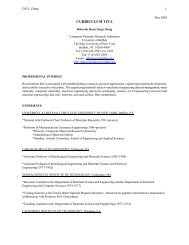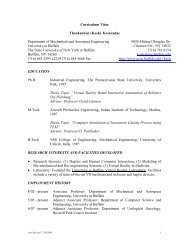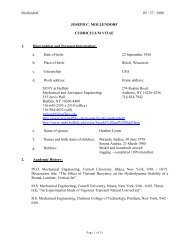MECHANICAL ENGINEERING - Mechanical and Aerospace ...
MECHANICAL ENGINEERING - Mechanical and Aerospace ...
MECHANICAL ENGINEERING - Mechanical and Aerospace ...
Create successful ePaper yourself
Turn your PDF publications into a flip-book with our unique Google optimized e-Paper software.
Program Planning for the B.S. Program in<br />
<strong>Mechanical</strong> Engineering<br />
The <strong>Mechanical</strong> Engineering Program consists of required courses <strong>and</strong> elective<br />
courses (the Science Elective, Applied Math Elective, Technical Electives <strong>and</strong> General<br />
Education coursework). The program is intended to provide a broad background in<br />
mathematics, physics, chemistry, <strong>and</strong> engineering science, together with sufficient depth in<br />
the required engineering courses to provide the essentials which form the base of the<br />
program. Building on the base, the student chooses additional technical <strong>and</strong> non-technical<br />
courses. Technical Elective courses allow students to obtain significant exposure to<br />
technical areas of their own choosing.<br />
A good program of non-technical electives will broaden student interests, permitting<br />
an appreciation of the various people <strong>and</strong> cultures within our society <strong>and</strong> the global<br />
community. In fact, current accreditation requirements require that students attain the<br />
broad education necessary to underst<strong>and</strong> the impact of engineering solutions in a global,<br />
economic, environmental, <strong>and</strong> societal context, a knowledge of contemporary issues, <strong>and</strong><br />
the ability to communicate effectively. Non-technical electives must be selected to satisfy<br />
the University-wide requirements for General Education <strong>and</strong> any related accreditation<br />
concerns particularly for transfer students.<br />
Of the total credit hours of coursework required for the B.S. in <strong>Mechanical</strong><br />
Engineering, 30 credit hours must be completed at this institution to satisfy our residency<br />
requirement. The st<strong>and</strong>ard program followed by a student making normal progress toward<br />
the degree may be completed in four academic years. The course load per semester<br />
varies from 15 to 18 credit hours. Those students who wish to attend Summer Session<br />
classes may reduce the calendar time required to complete the degree requirements.<br />
Elective Policy ME students are required to take a total of 12 hours of Technical Elective<br />
(TE) coursework, 3 hours of an Applied Math Elective, <strong>and</strong> 4 hours of a Science Elective. A<br />
TE course may be a course offered by the departments of the School of Engineering <strong>and</strong><br />
Applied Sciences (SEAS), or a course in mathematics or the sciences which is not a<br />
required course for the ME degree. TE courses may not substantially duplicate the material<br />
in a required course. All TEs must be coursework at the 300 level or above. In some<br />
instances graduate level courses may be used as TEs. Nine hours of TE credit must be<br />
selected from courses offered by the MAE Department. No more than two of the following<br />
courses may be used as TE courses: MAE 496, MAE 499, EAS 480, EAS 498, <strong>and</strong> EAS<br />
396/496 (for TE purposes EAS 396 <strong>and</strong> 496 together are equivalent to one MAE course).<br />
The General Education Program General education focuses on a broad array of skills,<br />
knowledge, <strong>and</strong> issues that the University’s faculty considers to be particularly important<br />
for all college graduates. The program is intended to help students prepare for success<br />
<strong>and</strong> fulfillment in a continually changing world. General education complements the<br />
departmental major. In particular, the General Education Program at the University at<br />
Buffalo, in accordance with SUNY policy, is designed to instill knowledge <strong>and</strong> skills in:<br />
Mathematics, Natural Sciences, Social Sciences, American History, Western Civilization,<br />
Other World Civilizations, Humanities, The Arts, Foreign Languages, <strong>and</strong> Basic<br />
Communication. In addition, requirements exist in two competencies: Critical Thinking<br />
(Reasoning), <strong>and</strong> Information Management. General education requirements are detailed<br />
in the undergraduate catalog (http://undergrad-catalog.buffalo.edu) <strong>and</strong> advisement<br />
regarding these requirements is available through the SEAS Office of Undergraduate<br />
Education in 410 Bonner Hall.


